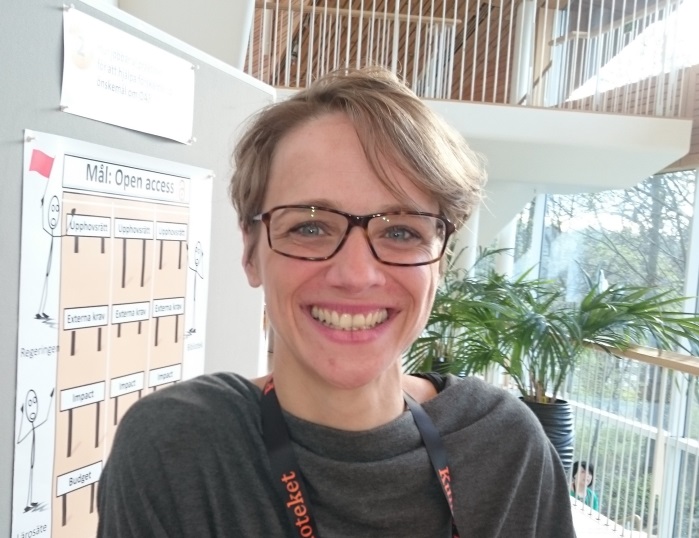
What is your scientific background?
 I hold a PhD in molecular biology but during my time as a PhD student I realized that it wasn’t where I belonged.
I hold a PhD in molecular biology but during my time as a PhD student I realized that it wasn’t where I belonged.
I loved science but I didn’t want to do it myself. Instead I wanted to bridge the gap between research and the public. I started to take classes in popular scientific communication and free-lanced as a science writer for a small company in Stockholm.
After finishing my PhD I landed a job at the communication department at Karlstad University and today I’m working with publishing support at the University library.
How do you spend a day in your job?
In my job no day is like the other and this is what I love about it. We try to support our researchers as much as we can, which means that we have a lot of meetings, e-mailing and lecturing on our schedule.
We read the news, are active in different networks and social media. Are there any new local or national laws/mandates that can influence our researchers with regard to outreach, bibliometrics and funding?
At the same time we need to constantly stay tuned with regard to what happens around us. We read the news, are active in different networks and social media. Are there any new local or national laws/mandates that can influence our researchers with regard to outreach, bibliometrics and funding? In that case we need to know it.
Me and my closest colleagues, there are two of them, one with a PhD in the social sciences and one librarian, are also responsible for our publishing press at the university and our university repository.
This part of our work complements our other tasks quite well as we stay up to date with regard to new publications and ongoing research. The latest thing that we are working on is a popular science podcast, where we interview our PhD students about their research. The goal is to bridge the gap between science and the public and make the research at our university understandable and accessible to anyone who wants to know about it.
What makes this a science job?
I am still very close to science but instead of digging deep into my own area of research I am now working with the research output of others. This gives me a much broader perspective and insights into research areas that I know nothing about.
I have also realized that it is hard to completely stop being a researcher. It happens quite frequently that I stumble upon things that I cannot find an answer for and that I’d like to analyze further.
Usually there is not enough time but quite recently my colleague and I realized that we might be able to do a little study that can help us to improve processes at work and that we could use the material we collect to write a small article.
What do you like most about your job?
I have worked at the university for three years and I’ve never been bored. The job is extremely varied and there are always new things coming my way.
I have worked at the university for three years and I’ve never been bored. The job is extremely varied and there are always new things coming my way. The mix of meeting people and working independently in front of the computer fits me well too.
As does the mix of highly intense working periods, with calmer periods that give time for reflection. Another thing that I really like about my job is our positive work environment. The job wouldn’t be as much fun if I wasn’t surrounded by all those great people.
Do you have any advice for current graduate students and postdocs looking to move out of the lab?
Do not hesitate to get in contact with people in the area that you would like to move into. Tell them your reason for contacting them and ask them whether you can come for a study visit to get a feel for what they do.
That way you can see if reality matches your expectations and at the same time establish networks that could help you to find a job.
If you realize that you lack essential skills, try and gain them during your time as a PhD/Post-doc. There are many online courses that can help you to complement your CV. It may be stressful at times but it is all worth it in the end.
Where can you be reached if readers want to ask you more about your job?
The best way to reach me is by email: Nadja.neumann@kau.se.
Do you have a job in science that you love? Know someone who can’t stop talking about their science career? Comment below or email me at dana.berry@biomedcentral.com if you’re interested in participating in our series. And join the conversation by using the #moretoscience hashtag on twitter.
Comments